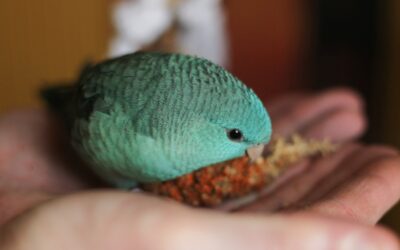Can dogs eat bananas safely? This question often pops up in the minds of pet owners, dog lovers, and even animal nutritionists.
Bananas are a popular fruit among humans, and it seems our four-legged friends are curious about them too. But are bananas good for dogs?
If you’ve ever wondered whether a banana could be a nutritious snack or a potential hazard for your pup, you’re in the right place.
This article will explore the ins and outs of feeding bananas to dogs, covering everything from nutritional benefits to potential risks.

Benefits of Bananas for Dogs and Humans
Fruit offers nutritional benefits for dogs and for humans. Below we have listed just a few of the many benefits of bananas.
- Nutrient-Rich: Bananas provide essential vitamins and minerals such as potassium, vitamin C, and vitamin B6, promoting overall health.
- Digestive Aid: The dietary fiber present in bananas can help regulate digestion and prevent constipation.
- Low in Calories: When given in moderation, bananas are a low-calorie treat option compared to many commercial dog treats, making them a suitable choice for maintaining a healthy weight.
- Energy Boost: The natural sugars in bananas can provide a quick energy boost, making them an excellent snack for active dogs.
- Soothing for Gums: Can dogs eat frozen bananas? Yes! Frozen bananas can be particularly soothing for teething puppies or dogs with sore gums.
- Natural Treat: Bananas are a natural alternative to processed dog treats, free from artificial additives and preservatives.
Benefits of Bananas for Humans
- Heart Health: High in potassium, bananas can help maintain normal blood pressure and support heart health.
- Digestive Health: The fiber content in bananas aids digestion and helps prevent gastrointestinal issues such as constipation.
- Energy Source: Rich in carbohydrates, bananas provide a quick source of energy, making them a popular snack for athletes and active individuals.
- Mood Booster: Bananas contain tryptophan, an amino acid that can help improve mood and alleviate stress by boosting serotonin levels.
- Nutrient-Dense: Bananas are packed with vitamins and minerals, including vitamin C, vitamin B6, and magnesium, contributing to a well-rounded diet.
- Convenient Snack: Easy to carry and consume, bananas make for a convenient and healthy snack option on-the-go.

Can Dogs Eat Banana Peels?
While dogs can eat bananas, the peels are another matter. Banana peels are not toxic to dogs, but they can be difficult for them to digest.
Eating banana peels can cause an upset stomach or even an intestinal blockage in some cases. Therefore, it’s best to avoid letting your dog eat banana peels.
If you’re keen on sharing this fruit with your pup, peel the banana first and offer the flesh in small, manageable pieces. This ensures that your dog can safely enjoy the fruit without any risk of digestive issues.
Other Fruits That Are Safe for Dogs
In addition to bananas, several other fruits can provide health benefits and enjoyment for dogs. Here are some safe options to consider next if your dog eat fruits and vegetables.
- Apples: A great source of vitamins A and C, apples (without seeds and core) can help freshen your dog’s breath and provide dietary fiber.
- Blueberries: Rich in antioxidants, blueberries can support your dog’s immune system and are an excellent low-calorie treat.
- Carrots: While technically a vegetable, carrots are a crunchy, nutritious snack high in beta-carotene and vitamin A, promoting healthy skin and eyesight.
- Pumpkin: Plain canned pumpkin (not the spiced pie filling) is beneficial for digestion and can help with both constipation and diarrhea.
- Watermelon: Hydrating and low in calories, seedless watermelon is a refreshing treat for dogs during hot weather. Just be sure to avoid the rind.
- Strawberries: High in fiber and vitamin C, strawberries can also contain an enzyme that helps whiten your dog’s teeth.
- Pineapple: This tropical treat is rich in vitamins and minerals but should be served in moderation due to its high natural sugar content.
- Cantaloupe: Another hydrating fruit, cantaloupe is low in calories and can be a sweet, enjoyable snack.
Remember to introduce any new fruit gradually and in moderation, ensuring that your dog does not have any adverse reactions. Always consult with a veterinarian regarding safe serving sizes and any specific dietary considerations.
How to Incorporate Bananas Into Your Dog’s Diet
Introducing bananas into your dog’s diet can be a fun and healthy experience. Start by offering small quantities as an occasional treat, maybe even try dried banana chips to prevent an upset stomach. You can cut the banana into bite-sized pieces, making it easier for your dog to eat.
For a refreshing twist, try offering frozen bananas, but not the whole banana. Dogs often love the cold texture, especially on hot days. Frozen bananas can also help soothe teething puppies, offering a cool and calming effect on their gums.

The Role of Bananas as a Nutritious Snack
When considering snacks for your dog, bananas are a nutritious option.
They provide essential nutrients that support various bodily functions, from maintaining healthy bones to aiding digestion.
However, be mindful of the sugar content, as feeding your dog too many bananas can lead to weight gain.
Bananas can serve as a healthy alternative to store-bought treats, which often contain artificial ingredients and preservatives.
By choosing natural snacks like bananas, you’re offering your dog a treat that’s both tasty and beneficial.
Understanding the Risks of Feeding Too Many Bananas
While bananas are good for dogs in moderation, feeding them too much banana can cause problems.
The high sugar content can lead to weight gain, and excessive banana consumption may result in digestive upset. It’s important to monitor your dog’s reaction and adjust the quantity accordingly.
Another risk is that bananas can fill your dog’s stomach quickly, leaving less room for other essential food items that make up a balanced diet.
To avoid this, use bananas as an occasional treat rather than a staple of your dog’s diet.

Alternative Ways to Serve Bananas to Dogs
There are several creative ways to serve bananas to dogs, ensuring they’re a fun part of your pet’s diet.
One popular option is banana chips, which are dried bananas that can be a crunchy and delightful treat.
However, make sure to choose unsweetened varieties to avoid additional sugar intake.
Banana bread is another option, but it should be homemade and free of ingredients that are toxic to dogs, such as chocolate or nuts.
Most dogs enjoy the banana flavor, and when made safely, banana bread can be a special treat.
Can Dogs Eat Banana Bread?
If you’re considering giving your dog banana bread, it’s important to proceed with caution.
While the basic ingredients of banana bread aren’t harmful, many recipes include add-ins that can be toxic to dogs. Ingredients like chocolate, raisins, and certain nuts pose health risks.
To safely feed banana bread to your dog, consider making a dog-friendly version. Use simple ingredients and avoid sugar and sweeteners.
Always offer banana bread in moderation as part of an occasional treat, ensuring it doesn’t make up a significant portion of your dog’s diet.

The Impact of Bananas on a Dog’s Weight
Weight gain is a concern for many pet owners, and it’s important to understand how bananas fit into this equation.
While bananas are a healthy snack, their natural sugar content can contribute to weight gain if consumed in large quantities.
To prevent unwanted weight gain, incorporate bananas as part of a balanced diet.
Monitor your dog’s overall calorie intake and ensure that treats like bananas do not exceed the recommended daily allowance.
Keeping your dog active and maintaining portion control is key to managing their weight effectively.
The Importance of Maintaining a Balanced Dog’s Diet
A well-rounded diet is crucial for a dog’s health and longevity.
While bananas can be a tasty addition, they should complement a balanced diet that includes high-quality proteins, carbohydrates, and vegetables.
Regularly assess your dog’s dietary needs based on their age, size, and activity level.
Consult with a veterinarian to ensure that your dog’s diet meets their nutritional requirements, including the appropriate amount of fruits and vegetables.

Monitoring Your Dog’s Reaction to New Foods
When introducing new foods like bananas, it’s essential to observe your dog’s reaction.
Watch for any signs of digestive upset, such as diarrhea or vomiting, and discontinue if necessary. Every dog is different, and what works for one may not work for another.
Take note of any changes in behavior or energy levels, as these can indicate how your dog is adjusting to new food items.
Documenting these observations can help you make informed decisions about what foods to continue or avoid.

Kate’s K9 Pet Care offers many services that will benefit your dog’s health and wellness. Contact us today!
Conclusion | Can Dogs Eat Bananas
Bananas can be a healthy and enjoyable treat for dogs when served safely and in moderation.
Packed with essential nutrients, they offer various health benefits while satisfying your dog’s taste buds.
However, it’s crucial to be mindful of the sugar content and to avoid banana peels, which can cause digestive issues.
By learning how to safely feed bananas and other dog-safe fruits to your dog, you can provide variety and nutrition.
Always monitor your dog’s reaction to new foods and consult with a veterinarian if you have concerns about specific dietary choices.
For more insights on feeding your furry friend, explore our additional resources and join the community of pet lovers dedicated to providing the best care for their canine companions.







